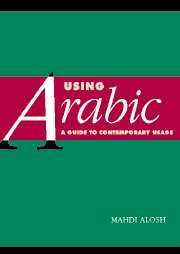One of the few articles that presents quantifiable data in support of teaching spoken Arabic (There are none that I know of that support the teaching of only Modern Standard Arabic (MSA)). The two go hand in hand it seems... to some extent. Teaching MSA only is a quick way to demotivate learners due to the lack of ability to speak with Arabs like they speak (ok, I don't have data to back up this claim). This article is about the teaching of spoken Arabic to young learners in Israel. The results show that student attitudes and motivation increased with the teaching of spoken Arabic. Here is the title followed by the source and authors:
The Effects of Teaching Spoken Arabic on Students’ Attitudes and Motivation in Israel
Modern Language Journal, Summer2004, Vol. 88 Issue 2, p217, 12p, 6 charts. Donitsa-Schmidt, Smadar; Inbar, Ofra; Shohamy, Elana
Here is the abstract:
The study investigated whether changes in the educational context of teaching Arabic as a second language in Israeli schools affect students' attitudes towards the language, its speakers and culture, and motivation to study the language. These changes included teaching spoken Arabic rather than Modern Standard Arabic and lowering the starting age of instruction. Self-report questionnaires were distributed to 692 students (4th–6th grade) and 362 parents from 14 elementary schools. The findings revealed that students who study spoken Arabic (experimental group), as opposed to those who do not (control group), report holding more positive attitudes towards the Arabic language, its culture, and speakers, and also claim to be more motivated to study the language. Findings also confirm the important role that parents have over their children's behavior because parents' attitudes constituted one of the predictors of students' motivation to study Arabic. Yet, the variable that best predicted students' motivation was their satisfaction with their Arabic study program. [ABSTRACT FROM AUTHOR]
Here is a paragraph from the body of the article:
"based on this research, it seems vital to include the spoken variety as a major component of the curricula. This inclusion is likely to allow students to communicate with Arabs using the colloquial variety of thelanguagethat isusedininformal settings
and may eventually lead to improved cultural understanding and better relations between the two ethnolinguistic groups. Finally, it is important to develop high quality programs and curricula for the teaching of the language in order to raise the level of satisfaction among students and their parents."
My comments:
One must take this article and my comments with a grain of salt. This article is talking specifically about the situation in Israel, and the research was performed on younger learners - not the kind reading this blog most likely. We can, however, learn from this article and follow the suggestions for future research as the field attempts to figure out how to teach MSA and spoken together. There are so many variables that such discussion is often simply avoided. For example, which dialect should be taught? How often? What about heritage learners? How can we present a spoken language to students? etc. Much more research needs to be done.
This article appeared in the Modern Language Journal, which is one of the most wide read and prestigious journals in the field of language learning. That fact alone gives the article credit.
Your comments?


